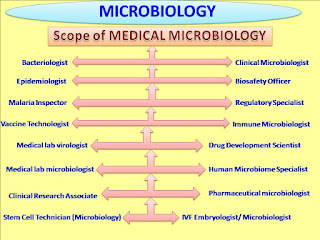Scope of Microbiology in Medical Field
Microorganism
are the most versatile organisms on earth and play pivot roles in various biological processes such as food spoilage,
disease spread, biodegradation, biodeterioration, climate change, food
spoilage, epidemiology and biotechnology. As
the major determinants of human health, microbes claim a primary, fundamental
role in all life forms on earth. Thus microorganisms and their
applications have great significance in medical and health sectors.
Medical
microbiology is a large subset of microbiology that is applied to medicine. It is a branch of medical science concerned with
the prevention, diagnosis and treatment of infectious diseases. It also
includes clinical supplication of microbes for better healthcare.
At present, the scientific, analytical and
problem-solving skills developed by microbiology graduates and are in high demand
by employers. There are various options available to you after gaining a Microbiology
degree. Some microbiologists work as
clinical scientists in hospitals, universities and medical school
laboratories. They are responsible to carry out research and give scientific
advice to medical staff. Pharmacists and microbiologists work
synergistically to ensure that drug development, therapies and target the
opportunistic microbes without harming its human host.
To pursue this
programme you need to have a B.Sc. degree in Microbiology. You can apply
for Ph.D. or M. Phil programmes as well after a postgraduate degree in
Microbiology.
The study in microbiology requires you to remember a
lot of facts about microscopic organisms, morphologies, applications and modes
of action etc.
Medical microbiologists support and oversee the prevention, diagnosis and treatment of illness
caused by microorganisms like bacteria, viruses, fungi and
parasites. Upon completion of a M.Sc. degree in Medical Microbiology/Microbiology,
one can have a plethora of job
opportunities in both government and private sectors.
Opportunities are wide open in various fields like healthcare
organizations, forensic science laboratories, environmental organizations,
higher education institutions, food and drink, publicly funded research
organizations, pharmaceuticals and many other industries. Other tasks may include monitoring the
evolution of potentially virulence in microbes,
identification of potential health risks to the
human population or resistant strains of microbes, educating the community and
assisting in the planning and design of health practices. They may also assist
in preventing or controlling epidemics and
outbreaks of emerging diseases.
In the future, microbiology recruitments would be in
high numbers due to need for development
of more rapid medical diagnostics, increased research in testing and higher
adaptability to cope up with new threats from infectious microorganisms,
such as agents of bioterrorism and emerging pathogens. Thus microbiology has
great importance in dealing with the health and medical aspects in humans as a
whole.
Department of Microbiology
Career College, Bhopal.



Very informative 👍 Thank you for sharing 👏👏
ReplyDeleteVery Important information
ReplyDeleteWorthy to read
ReplyDeleteGood scope for upcoming generation.
ReplyDeleteVarsatile opportunity and very informative
ReplyDeleteExcellent Very informative knowledge
ReplyDeleteInformative
ReplyDeleteExcellent
ReplyDeleteVery informative
ReplyDeleteVery well explained
ReplyDeleteWell explanation for all...
ReplyDeleteThe blog gives complete information about Microbiology. It clearly indicates vast scope of Microbiology to the young bio students.
ReplyDelete